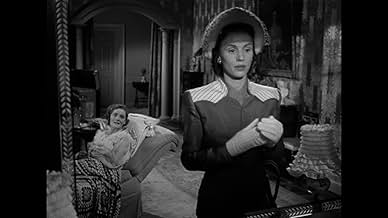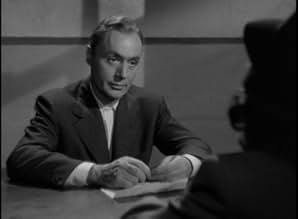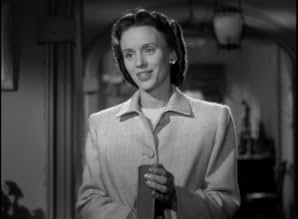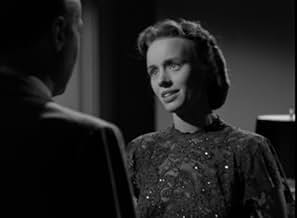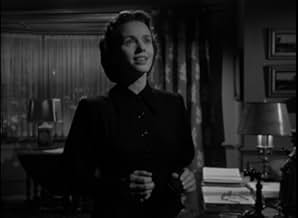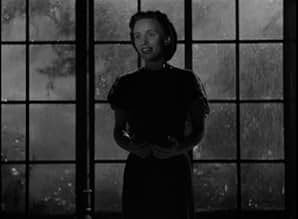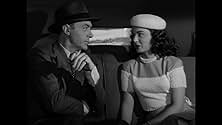IMDb-BEWERTUNG
6,8/10
1020
IHRE BEWERTUNG
Füge eine Handlung in deiner Sprache hinzuA cheating husband is charged in the poisoning death of his invalid wife, in spite of other women and suicide also being suspected.A cheating husband is charged in the poisoning death of his invalid wife, in spite of other women and suicide also being suspected.A cheating husband is charged in the poisoning death of his invalid wife, in spite of other women and suicide also being suspected.
- Auszeichnungen
- 3 wins total
Patrick Aherne
- Warder
- (Nicht genannt)
Mari Aldon
- Girl
- (Nicht genannt)
Wilson Benge
- Clerk
- (Nicht genannt)
Lydia Bilbrook
- Mrs. Fellows
- (Nicht genannt)
Empfohlene Bewertungen
Henry Maurier (Boyer) is an arrogant wealthy Englishman married to Emily who is both sickly and shrewish. Doris (Blyth) is his much younger mistress. The Maurier's also have a woman friend named Janet Spence (Tandy) who has always loved Maurier. When Emily is poisoned, suspicion falls on Henry and there is a great deal of circumstantial evidence against him. The script, by Aldous Huxley, is extremely literate and the movie is a pleasure to watch. Courtroom fans will also enjoy the capably executed inquest and trial scenes.
An excellent psychological thriller , based on Aldous Huxley's novella (adapted by himself,but the Mona Lisa title was better than that of the film) , with a stellar cast .
Although "Rebecca " was written after Huxley's work , there are shades of Du Maurier's tale : "I feel she's still here" ;in the movie, (like in real life),Boyer is French : il s'appelle Maurier ici ! The scene of the thunder over the house is a great moment to rival the best of Gothic horror movies ;and it' not gratuitous for it comes back in the extraordinary final Boyer/Tandy confrontation which makes your hair stand on end ;the way both are filmed (she seems to be an exterminating angel watching him in Hell) is stunning. In my book ,Tandy steals the show from Blyth .
This "beyond the grave" vengeance will remind you of Stahl's "leave her to heaven " (1946); it's a must for Gothic melodramas buffs.
Although "Rebecca " was written after Huxley's work , there are shades of Du Maurier's tale : "I feel she's still here" ;in the movie, (like in real life),Boyer is French : il s'appelle Maurier ici ! The scene of the thunder over the house is a great moment to rival the best of Gothic horror movies ;and it' not gratuitous for it comes back in the extraordinary final Boyer/Tandy confrontation which makes your hair stand on end ;the way both are filmed (she seems to be an exterminating angel watching him in Hell) is stunning. In my book ,Tandy steals the show from Blyth .
This "beyond the grave" vengeance will remind you of Stahl's "leave her to heaven " (1946); it's a must for Gothic melodramas buffs.
Rachel Kempson is the bedridden, whining wife of rich Charles Boyer. She complains about everything and everyone, and only Mildred Natwick, as her man-hating nurse, seems to sympathize with her. Boyer does what he can in a weary, dutiful manner, but takes pleasure in flirting with next-door neighbor Jessica Tandy on the subject of modern art. He's also got Ann Blyth as an 18-year-old mistress. Then Kempson dies, Boyer marries his pregnant mistress almost immediately, and Miss Natwick insists on an autopsy. It turns out the dead woman was poisoned, and Boyer is on trial for murder.
I thought the first half of this movie was fabulous, with a cast that played it to the hilt, particularly Mildred Natwick, so vilely self-righteous. The problem for me lay in the second half, because I picked out the murderer as soon as the death scene was described, and Hardwicke's pick-pick-picking at the scabs of the other character's souls, beautifully written by Aldous Huxley, and performed though it was, seemed to me long-winded.
That's the problem when you figure out a mystery well before the end, motive, method and opportunity; you spend the time wondering how everyone in the movie (or book) can be so blind. So I spent my time reworking it as a stage play, wondering about the bare minimum of sets. I made it four.
I thought the first half of this movie was fabulous, with a cast that played it to the hilt, particularly Mildred Natwick, so vilely self-righteous. The problem for me lay in the second half, because I picked out the murderer as soon as the death scene was described, and Hardwicke's pick-pick-picking at the scabs of the other character's souls, beautifully written by Aldous Huxley, and performed though it was, seemed to me long-winded.
That's the problem when you figure out a mystery well before the end, motive, method and opportunity; you spend the time wondering how everyone in the movie (or book) can be so blind. So I spent my time reworking it as a stage play, wondering about the bare minimum of sets. I made it four.
Aldous Huxley possessed one of the greatest intellects and was one of the most original thinkers of the Twentieth, or indeed, any century. He also made a great deal of money writing screenplays in Hollywood.
His short story of 1922 'The Giaconda Smile' is his most anthologised and so as not to baffle the average cinema-goer the title here has been changed to 'A Woman's Vengeance' which merely serves to give the game away from the outset!
We should be grateful at least that the adaptation has not been assigned to some Hollywood hack but has been done by the author himself although the infernal compromises of film have obliged him to deviate from his original.
The suspected wife poisoner has been transformed from the flawed Anglo-Saxon Hutton to the Gallic Maurier of inveterate charmer Charles Boyer and his naive bit of fluff Doris, played by Ann Blythe, is needless to say no longer a Cockney! The character of Janet Spence, described by Huxley as resembling Agrippina 'or perhaps George Robey', is played by Jessica Tandy. All do what they do very well but it is the performance of the superlative Miss Tandy that lingers longest. She depicts frustrated passion and sexual repression as strongly as would have been permitted at the time and is absolutely riveting if a little too attractive.
For filmic purposes the character of Doctor Libbard has been fleshed out considerably by Mr. Huxley and is beautifully played by Cedric Hardwicke. His character not only serves as Maurier's conscience but saves him from the gallows, thereby drastically altering the original ending but that's Hollywood for you.
It is capably directed by Zoltan Korda although one senses that he is more suited to the great outdoors. Noirish touches by cinematographer Russell Metty and a suitably dramatic score by the great Miklos Rozsa.
It was Sir Cedric who said: "God felt sorry for actors so he created Hollywood to give them a place in the sun and a swimming pool. The price they had to pay was to surrender their talent." The same would apply to writers it seems!
His short story of 1922 'The Giaconda Smile' is his most anthologised and so as not to baffle the average cinema-goer the title here has been changed to 'A Woman's Vengeance' which merely serves to give the game away from the outset!
We should be grateful at least that the adaptation has not been assigned to some Hollywood hack but has been done by the author himself although the infernal compromises of film have obliged him to deviate from his original.
The suspected wife poisoner has been transformed from the flawed Anglo-Saxon Hutton to the Gallic Maurier of inveterate charmer Charles Boyer and his naive bit of fluff Doris, played by Ann Blythe, is needless to say no longer a Cockney! The character of Janet Spence, described by Huxley as resembling Agrippina 'or perhaps George Robey', is played by Jessica Tandy. All do what they do very well but it is the performance of the superlative Miss Tandy that lingers longest. She depicts frustrated passion and sexual repression as strongly as would have been permitted at the time and is absolutely riveting if a little too attractive.
For filmic purposes the character of Doctor Libbard has been fleshed out considerably by Mr. Huxley and is beautifully played by Cedric Hardwicke. His character not only serves as Maurier's conscience but saves him from the gallows, thereby drastically altering the original ending but that's Hollywood for you.
It is capably directed by Zoltan Korda although one senses that he is more suited to the great outdoors. Noirish touches by cinematographer Russell Metty and a suitably dramatic score by the great Miklos Rozsa.
It was Sir Cedric who said: "God felt sorry for actors so he created Hollywood to give them a place in the sun and a swimming pool. The price they had to pay was to surrender their talent." The same would apply to writers it seems!
"A Woman's Vengeance" is unusual in that it was written by Aldous Huxley, they author of the brilliant "Brave New World" and the son of the famous evolutionist, Thomas Henry Huxley. I had no idea he wrote this sort of story...a murder mystery.
When the story begins, Henry (Charles Boyer) and his wife, Emily, are having a fight. It seems that Emily is a very histrionic and demanding woman...the sort that would be nearly impossible to love. On the other hand, Henry isn't exactly an angel...he's got a VERY young girlfriend (Ann Blythe) on the side. He also has a family friend, Janet (Jessica Tandy), who loves him.
One day after yet another fight brought on by Emily, Henry goes out to spend the day with his mistress. During this time period, Emily dies of a heart attack...thus freeing Henry to marry his girlfriend. But once he does, Janet and, especially, the family's maid (Mildred Natwick) begin to wonder if Emily died a natural death. Soon, there is an exhumation and it's determined that Emily was poisoned!! Did Henry do it? After all, he clearly had the most to gain and any man married to Emily would be likely to at least consider poisoning her! Or is there some other answer?
The story is greatly helped by its cast. It's easy to make a good film with the likes of Charles Boyer, Jessica Tandy, Mildred Natwick, John Williams and Cederic Hardwicke in a movie...and it's obvious Universal Pictures put a lot of money into the production.
It's also helped that the story is so clever and offers some interesting twists. I also appreciate that the characters are quite flawed...much like many real people. Overall, well worth seeing and wonderfully well acted.
When the story begins, Henry (Charles Boyer) and his wife, Emily, are having a fight. It seems that Emily is a very histrionic and demanding woman...the sort that would be nearly impossible to love. On the other hand, Henry isn't exactly an angel...he's got a VERY young girlfriend (Ann Blythe) on the side. He also has a family friend, Janet (Jessica Tandy), who loves him.
One day after yet another fight brought on by Emily, Henry goes out to spend the day with his mistress. During this time period, Emily dies of a heart attack...thus freeing Henry to marry his girlfriend. But once he does, Janet and, especially, the family's maid (Mildred Natwick) begin to wonder if Emily died a natural death. Soon, there is an exhumation and it's determined that Emily was poisoned!! Did Henry do it? After all, he clearly had the most to gain and any man married to Emily would be likely to at least consider poisoning her! Or is there some other answer?
The story is greatly helped by its cast. It's easy to make a good film with the likes of Charles Boyer, Jessica Tandy, Mildred Natwick, John Williams and Cederic Hardwicke in a movie...and it's obvious Universal Pictures put a lot of money into the production.
It's also helped that the story is so clever and offers some interesting twists. I also appreciate that the characters are quite flawed...much like many real people. Overall, well worth seeing and wonderfully well acted.
Wusstest du schon
- WissenswertesHenry Maurier quotes from Wordsworth's 'Ode to Duty' (published 1807): "Stern daughter of the Voice of God"
- PatzerAlthough Emily's gravestone and numerous newspaper articles establish the time of the story as 1931 all the women's hair styles, clothing, and overall demeanor are strictly 1947.
- Zitate
General Spence: Wouldn't have minded being a dog myself. Comfortable kennels, free meals, unlimited access to the females of the species, and when you're old, they shoot you. No wheelchairs, no torture, no blasted nurses - one bang and it's over.
- VerbindungenReferenced in Inside the Actors Studio: Martin Scorsese (2002)
Top-Auswahl
Melde dich zum Bewerten an und greife auf die Watchlist für personalisierte Empfehlungen zu.
- How long is A Woman's Vengeance?Powered by Alexa
Details
- Erscheinungsdatum
- Herkunftsland
- Offizielle Standorte
- Sprachen
- Auch bekannt als
- A Woman's Vengeance
- Drehorte
- Produktionsfirma
- Weitere beteiligte Unternehmen bei IMDbPro anzeigen
- Laufzeit
- 1 Std. 36 Min.(96 min)
- Farbe
- Seitenverhältnis
- 1.37 : 1
Zu dieser Seite beitragen
Bearbeitung vorschlagen oder fehlenden Inhalt hinzufügen

